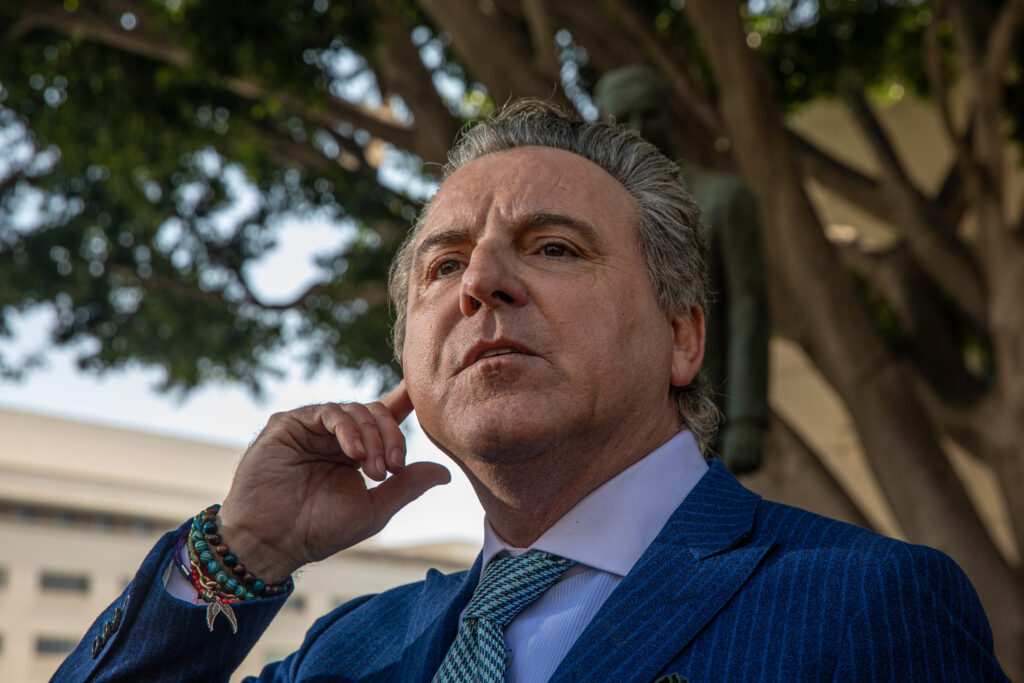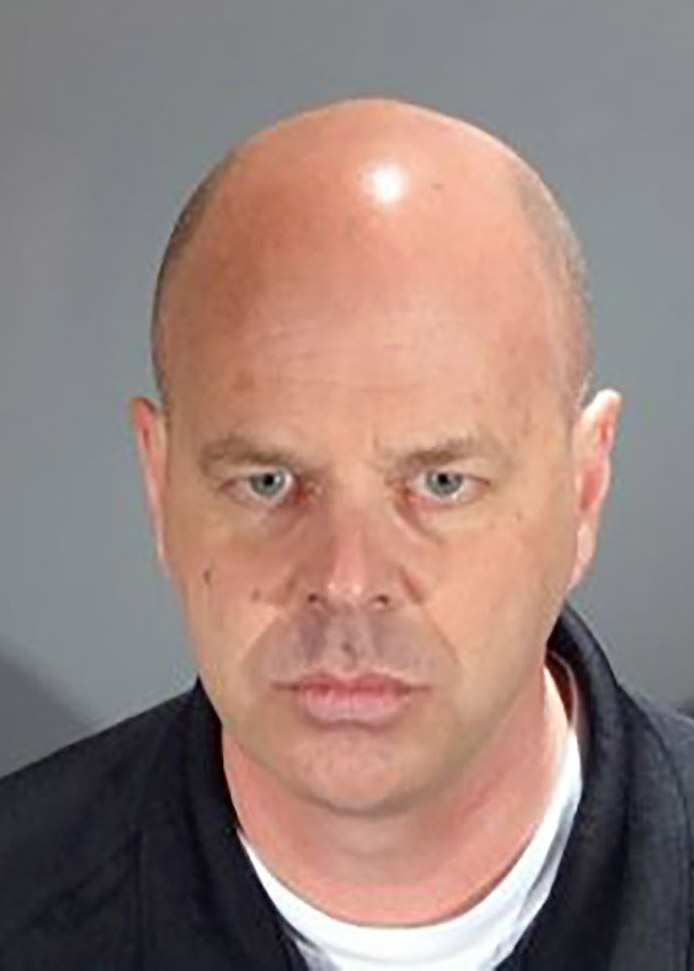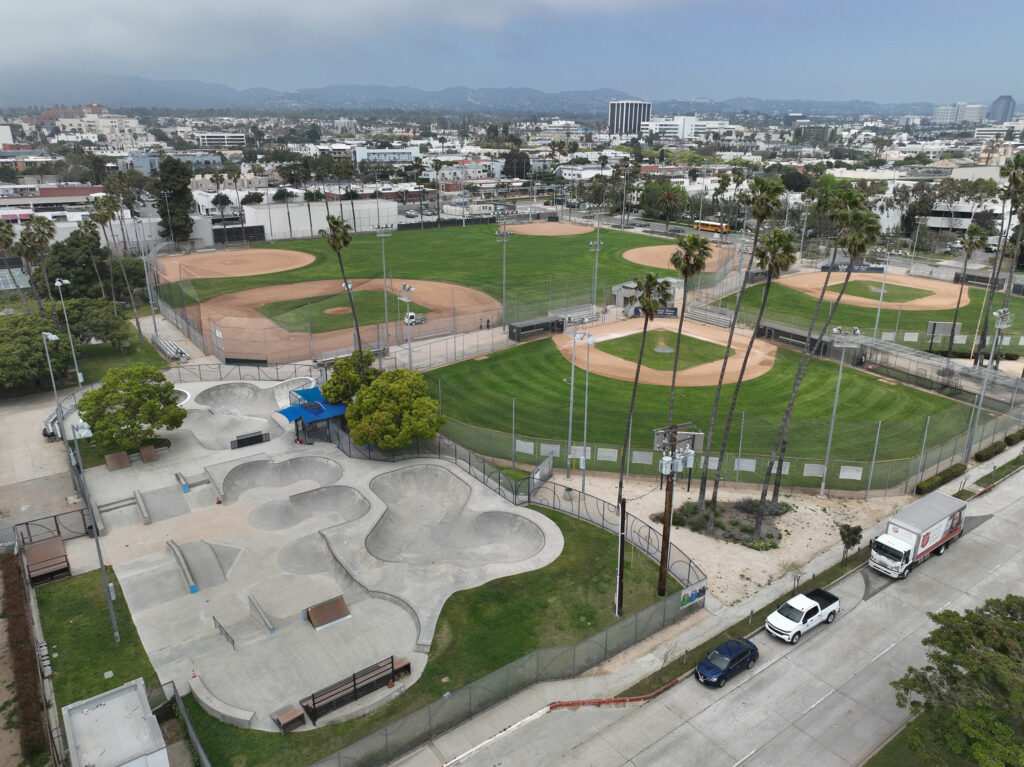In nearly three decades as a civilian employee with the Santa Monica Police Department and the city, Eric Uller was considered a standout public servant who won awards for his technological innovations.
But his biggest claim to fame was his work as a volunteer in the Police Activities League, where, beginning in the late 1980s, he worked with boys and girls in the nonprofit’s after-school program.
Uller was a familiar face at the PAL center that served Santa Monica’s Latino neighborhoods, often traveling in a police vehicle and befriending generations of youths.
It took decades to uncover that Uller was a sexual predator, the center of a stunning series of crimes that destroyed the lives of children and exposed grave questions as to why it took so long for authorities to uncover what he was doing.

Now, more than 200 people have come forward to say they were abused by Uller, most of whom were underprivileged children looking for guidance and activities and city programs. Court documents show he often preyed on vulnerable boys whose parents were in this country without proper immigration papers. Criminal investigations and civil lawsuits have revealed numerous missed warnings about Uller’s abuse over many years.
This week , Santa Monica settled more lawsuits, bringing its total payout to $229.285 million — the most costly single-perpetrator sexual abuse disbursement for any municipality in the state. But more than the money, the case has sparked intense criticism over why the city could not protect its children.
“How could this go on for so long? There is a generational trauma in the community because of Uller,” City Councilman Oscar de la Torre said.
“You have to understand in this liberal city, this is a Black and brown part of the city, and no one in the government was watching out for our kids. The Pico neighborhood was marginalized in that era,” said de la Torre, noting that Uller’s abuse occurred “under the shield of law enforcement” and “not one person lost a job” in response to the oversight.
Luring victims with police connections

Uller, a Santa Monica police dispatcher from a wealthy medical family, joined PAL in 1989 as a mentor for troubled youth, records show. The launch of the police-sponsored group coincided with a massive surge in violent crime and the growth of gangs, and the program was an effort to thwart that influence in the impoverished parts of Santa Monica.
He almost immediately began targeting Latino boys between the ages of 12 and 15 from the Pico neighborhood, but some were as young as 8, said attorney Brian Claypool, who has represented more than 80 victims.
Victims said Uller used his police connections to lure them.
“He bribed me with money, baseball cards, Dodger tickets, lunch,” said John AM Doe, one of hundreds of former PAL youth who accused Uller of repeated rape and sexual abuse over two years and blamed the city for allowing a predator to stalk children.
John AM Doe was identified in court documents by a pseudonym and is not being identified by the Los Angeles Times, which generally does not name the victims of sexual assault. He said he was 12 when he met Uller, who drove him and other boys around in his Chevy Suburban, which was outfitted with a police radio, or in an unmarked police car given to him by the department. He recalls Uller having a badge and handcuffs and said he even left a gun on the car seat once.

“Everyone thought he was a police officer,” John AM Doe said.
John Doe 4 was 11 when the abuse began in 1989, court records show. The boy was first molested when Uller took him to his father’s medical office under the pretext of getting a physical exam needed to play sports, a ploy Uller used repeatedly, authorities said. The abuse continued for two years, according to court documents.
Warnings ignored
A Santa Monica police sergeant became suspicious of Uller’s behavior with a boy between 1991 and 1993 and launched an investigation, according to a 2018 Los Angeles County Sheriff’s Department report reviewed by the Times.
Michelle Cardiel, a PAL employee from 1990 to 1998, told a sheriff’s detective that “the child went everywhere with Eric, and it seemed odd.”
Cardiel told sheriff’s investigators that around 1995, a boy told her that Uller had offered to help “clean his penis because his father is a doctor.” Cardiel reported the incident to Santa Monica police Officer Jay Trisler, who was then assigned to the PAL program, and Trisler said he would investigate. She also told her PAL boss, Patty Loggins, who told Cardiel that she would be written up if she kept spreading workplace gossip, according to the sheriff’s report.
The following day, Cardiel said, Uller approached her and said the interaction he’d had with the boy had been inappropriate and begged her not to mention it again.
Neither Trisler nor Loggins returned messages for comment.
In an interview with the Times, Cardiel recalled two officers who interviewed the boy at the time saying “there had been a misunderstanding,” and Uller never touched the child.
No action was taken against Uller.
In a sworn declaration obtained by the Times, a female detective with the sheriff’s juvenile unit whose identity is being withheld from this report said she became suspicious of Uller, noting he “was becoming too close, both physically and emotionally, with the boys that I saw him with.”
“I thought that Eric’s behavior and involvement around the boys was not appropriate, and so I reported my concerns to my sergeant and my lieutenant,” the detective said, noting that she was told by her superiors it was not her business.
She said she also discovered that Uller had had boys over at his house and had taken them on weekend trips. When she told him to stop this behavior, he ignored her, she said in the declaration.
“When I think about how he molested these boys while I was a Santa Monica police officer whose job it was to protect kids from people like Eric, it breaks my heart,” she wrote.
Cardiel also recounted how teenage boys would turn up at the PAL office in Memorial Park with the latest Air Jordans or other clothing and say Uller bought them.
“Uller befriended all the officers and managers and dazzled them with his computer skills,” Cardiel said.
After starting as a 911 dispatcher, Uller rose to become the principal systems analyst for the city’s information technology department, and in 2009 he was awarded the Santa Monica Rotary Club’s public service award. He spent most of his career overhauling the 911 system, overseeing the city’s surveillance cameras, rebuilding the arrest and traffic violation databases and constructing a crime-mapping system.
According to the sheriff’s report from 2018, several former Santa Monica city employees told detectives they reported Uller’s misconduct.
Retired Santa Monica police Lt. Greg Slaughter, who headed the department’s communications center where Uller was the lead systems analyst, said that one morning in the early 2000s, a supervisor turned on a computer for work and child pornography popped up on the screen. Slaughter said he immediately ordered an investigation, which led to Uller, but he was never interviewed regarding the allegations.
Slaughter told a sheriff’s investigator that Uller reported directly to the chief of police, James Butts.
“The rank structure was overlooked for Eric’s behalf,” Slaughter said in the sheriff’s report.
Slaughter also said he witnessed Uller driving young boys “all over town” and reported it to his bosses. He said that after learning that Uller “was given a take-home, fully equipped unmarked police vehicle,” he told the department’s chief of staff that such use was improper.
Butts, who led the Santa Monica Police Department from 1991 to 2006 and is now mayor of Inglewood, said Tuesday in an email to the Times that he “was never made aware of any allegations against Uller or anyone in the program.”
‘He could get away with whatever he wanted’
Some of Uller’s victims recalled he would even turn on the police lights and siren as he drove them home, further enforcing the idea that he was a cop working under the color of authority, documents summarizing the victims’ accounts reveal.
Uller bribed some with $20 bills, trips to Lakers games or McDonald’s and video games, according to witness statements. Others he threatened, particularly those who’d had scrapes with the law or whose families’ immigration status made them vulnerable.
“I couldn’t say nothing because my family would go to jail,” said John AM Doe, who said he was abused by Uller for two years. “It was as if he could get away with whatever he wanted.”
Another victim alleged that Uller began abusing him as a teenager after he was arrested by Santa Monica police. As the young man struggled with other run-ins with the law, he was forced to submit to sex acts with Uller, according to his court claim records.
“The unspoken threat is if I didn’t go along with Eric, I would go to jail,” the man said in a recent court declaration.
Initially, Uller took boys to dark alleyways not far from their homes, investigators said. He would drive them in an unmarked police car or his Suburban or a Toyota 4Runner, both of which had dark-tinted windows. He also used a pitch-black side street next to Woodlawn Cemetery as a stopping point. As he became more brazen, he began using the PAL van and the nonprofit’s office for his abuse, court records show.
By the mid-1990s, Uller was abusing a boy identified as John Doe 6, who was 13 or 14. Uller told the victim he could get him a job, but the teen would first need to get a “physical exam.” Uller then took him to his father’s office after hours and molested him, the lawsuit states. The abuse continued for four years.
A suicide and secrets revealed
Uller’s public facade as a friendly authority figure helping troubled kids began to unravel in 2018, when he was arrested on suspicion of molesting four boys while he was a PAL volunteer during the early 1990s, according to Sheriff’s Department records.
Uller, 50, was charged with multiple counts of lewd acts on a child. Following his arrest, six additional people came forward to accuse the longtime city employee of sexual abuse. But on the day he was scheduled to appear in court, Uller was found dead by suicide in his Marina del Rey apartment.
In the wake of Uller’s death, the Santa Monica Police Department announced it was referring to the Sheriff’s Department an allegation that individuals who knew of Uller’s abuses had failed to raise any alarms as required by the Child Abuse Neglect and Reporting Act. But no one was ever charged. And Uller’s personnel file had no documentation of any “complaints, allegations or investigations regarding sexual abuse” or misconduct involving PAL, according to the sheriff’s report.
On the contrary, in May 1999, Uller was heralded by Santa Monica police as civilian employee of the year and received a standing ovation. “There appears to be no one in the department that Uller has not helped with his ability to repair computers, program radios and volunteer for a host of events,” a citation noted.
Claypool, a lawyer representing John AM Doe and dozens of other plaintiffs, said he’s never seen a sexual abuse case like this.
“We have a city tech guy playing a cop in front of real cops, giving kids rides at night alone, going on trips,” Claypool said. “The Police Department and the city had repeated warnings. Staff and kids complained to Santa Monica police officers, saying he was doing these horrendous things.”
A legacy of abuse and pain
In response to numerous questions from the Times, the city called Uller’s abuse “heartbreaking and disturbing” and said that since learning of the allegations in 2018, it has taken actions to ensure the safety of youth across all city programs. Officials also hired a consulting firm experienced in sexual abuse investigations and approved a Child Protection Resolution to help detect inappropriate behaviors and prevent abuse.
Mayor Gleam Davis said Santa Monica has “modified virtually every program in this community that addresses youth,” noting the abuse occurred two to three decades ago and none of the current city leadership or PAL staff were there at the time.
“I want to make sure everyone understands that this was a sad chapter of the city’s history, and we hope and pray that this will never happen again,” Davis said Tuesday following the vote to approve the settlement. “Our hearts go out to the victims who experienced so much pain and heartbreak.”
But the measures and the settlement can’t make up for all the young lives that Uller shattered, John AM Doe said.
“I dropped out of school. I had kids that I didn’t pay attention to. I went to jail for making bad choices,” said John AM Doe, who spent three years in prison. “I see his name every f—ing day and night in my mind.
“There is no dollar amount that will fix what I go through,” he said.
___
© 2023 Los Angeles Times
Distributed by Tribune Content Agency, LLC.



